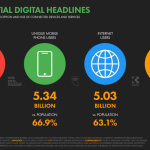Unlocking The Power Of Latest Retail Technology Trends: Your Next Business Game-Changer!
Latest Retail Technology Trends
Welcome, readers, to this article on the latest retail technology trends. In today’s fast-paced digital world, the retail industry is constantly evolving and embracing new technologies to enhance the shopping experience for customers. In this article, we will explore the most recent advancements in retail technology and their impact on the industry.
Introduction
Retail technology has come a long way in recent years, revolutionizing the way consumers shop and businesses operate. From advanced analytics to artificial intelligence, retailers are leveraging technology to streamline operations, personalize customer experiences, and drive sales.
1 Picture Gallery: Unlocking The Power Of Latest Retail Technology Trends: Your Next Business Game-Changer!

In this article, we will discuss the key trends in retail technology and how they are shaping the industry. We will explore the benefits and challenges associated with these technologies, as well as their potential impact on businesses and consumers.
1. What are the latest retail technology trends?
🔍 The retail industry is witnessing several groundbreaking technology trends that are transforming the way businesses operate:
Artificial Intelligence (AI): AI-powered technologies, such as chatbots and virtual assistants, are revolutionizing customer service by providing personalized recommendations and assistance.

Image Source: easternpeak.com
Internet of Things (IoT): IoT devices enable retailers to gather real-time data, optimize inventory management, and enhance the overall shopping experience.
Augmented Reality (AR): AR technology allows customers to virtually try on products, visualize furniture in their homes, and experience products before making a purchase.
Mobile Commerce: With the increasing use of smartphones, retailers are focusing on mobile-friendly websites and apps to provide a seamless shopping experience on mobile devices.
Data Analytics: Advanced analytics tools help retailers analyze customer behavior, preferences, and trends, enabling them to make data-driven decisions and offer personalized experiences.
Robotics and Automation: Retailers are embracing robotics and automation to streamline operations, optimize inventory management, and improve order fulfillment.
2. Who is adopting these technologies?
👥 The adoption of these retail technologies is widespread among both large and small businesses. Established retail giants and e-commerce companies are investing heavily in these technologies to stay ahead of the competition and meet evolving customer expectations. Additionally, small and medium-sized retailers are also embracing these technologies to enhance the customer experience and improve operational efficiency.
3. When did these trends emerge?
⌛ The emergence of these retail technology trends can be attributed to the rapid advancements in digital technology over the past decade. As consumers increasingly rely on technology for their shopping needs, retailers have been compelled to adapt and integrate these technologies into their operations. The widespread availability of smartphones and high-speed internet has also played a significant role in driving the adoption of these technologies.
4. Where are these technologies being implemented?
🌍 These retail technology trends are being implemented across various retail sectors and geographies. From traditional brick-and-mortar stores to e-commerce platforms, retailers worldwide are leveraging these technologies to improve customer experiences, optimize supply chain management, and drive sales. The adoption of these technologies is not limited to specific regions but is rather a global phenomenon.
5. Why are these trends significant?
❓ These retail technology trends are significant for several reasons:
Enhanced Customer Experience: By leveraging these technologies, retailers can provide personalized recommendations, seamless shopping experiences, and interactive product demonstrations, thereby enhancing customer satisfaction.
Improved Operational Efficiency: Automation, data analytics, and IoT enable retailers to optimize inventory management, streamline operations, and improve the overall efficiency of their businesses.
Competitive Advantage: Adopting these technologies gives retailers a competitive edge, allowing them to differentiate themselves in a crowded market and attract and retain customers.
Insights and Data-driven Decision Making: Advanced analytics tools provide retailers with valuable insights into customer behavior, preferences, and market trends, enabling them to make data-driven decisions and stay ahead of the competition.
Increased Sales and Revenue: By offering personalized experiences and streamlining operations, retailers can drive sales and increase revenue.
6. How can businesses implement these technologies?
🔨 Implementing these retail technology trends requires a strategic approach:
Identify Business Goals: Retailers should first identify their business goals and objectives. Whether it’s enhancing the customer experience, optimizing operations, or increasing sales, having a clear vision will guide the implementation process.
Evaluate Technology Solutions: Research and evaluate different technology solutions available in the market, keeping in mind the specific needs and requirements of the business.
Plan and Budget: Creating a detailed plan and budget is crucial for successful implementation. Consider factors such as costs, implementation timelines, and training requirements.
Collaboration and Training: Engage employees and provide comprehensive training to ensure a smooth transition and successful adoption of these technologies.
Measure and Adapt: Continuously monitor the impact of these technologies on the business and make necessary adjustments to optimize their effectiveness.
Advantages and Disadvantages of Latest Retail Technology Trends
Advantages:
1. Improved Customer Experiences: Retail technology enhances customer experiences by providing personalized recommendations, seamless shopping experiences, and interactive product demonstrations.
2. Operational Efficiency: Automation, data analytics, and IoT enable retailers to optimize inventory management, streamline operations, and improve overall efficiency.
3. Competitive Edge: Adopting these technologies gives retailers a competitive advantage, allowing them to differentiate themselves in the market and attract and retain customers.
4. Data-driven Decision Making: Advanced analytics tools provide valuable insights into customer behavior, preferences, and market trends, enabling data-driven decision-making.
5. Increased Sales and Revenue: By offering personalized experiences and streamlining operations, retailers can drive sales and increase revenue.
Disadvantages:
1. Implementation Costs: Implementing these technologies can be costly, especially for small businesses with limited budgets.
2. Training and Employee Resistance: Employees may require training to use these technologies effectively, and there may be resistance to change.
3. Data Privacy and Security Risks: Retailers must address concerns regarding data privacy and security when implementing these technologies.
4. Technical Challenges: Integrating different technologies can pose technical challenges, requiring expert knowledge and support.
5. Potential Job Displacement: Automation and robotics may lead to job displacement for some retail employees, requiring businesses to manage this transition effectively.
Frequently Asked Questions (FAQs)
1. What is the future of retail technology?
The future of retail technology looks promising, with continuous advancements in AI, IoT, and data analytics. Retailers will increasingly rely on these technologies to provide personalized experiences, improve operational efficiency, and gain a competitive edge.
2. How can AI benefit the retail industry?
AI can benefit the retail industry by enhancing customer service through chatbots and virtual assistants, providing personalized recommendations, and optimizing inventory management and supply chain operations.
3. Are retail technologies only suitable for large businesses?
No, retail technologies are suitable for businesses of all sizes. Small and medium-sized retailers can also benefit from these technologies by enhancing the customer experience, improving operational efficiency, and gaining a competitive edge.
4. What are the potential risks of implementing retail technologies?
Potential risks include high implementation costs, training requirements, data privacy and security concerns, technical challenges, and potential job displacement due to automation and robotics.
5. How can retailers measure the success of retail technology implementation?
Retailers can measure the success of retail technology implementation by tracking key performance indicators (KPIs) such as customer satisfaction, sales growth, operational efficiency, and ROI.
Conclusion
In conclusion, the latest retail technology trends have the potential to transform the industry by enhancing customer experiences, improving operational efficiency, and driving sales. Retailers of all sizes can benefit from these technologies, but careful planning, budgeting, and employee training are essential for successful implementation. By embracing these trends, retailers can stay ahead of the competition and meet the evolving needs and expectations of their customers.
Final Remarks
Disclaimer: The information provided in this article is for general informational purposes only. While we strive to keep the information up to date and correct, we make no representations or warranties of any kind, express or implied, about the completeness, accuracy, reliability, suitability, or availability of the information contained herein. Any reliance you place on such information is therefore strictly at your own risk.
This post topic: Latest Technology Trends



